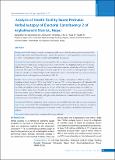Please use this identifier to cite or link to this item:
https://hdl.handle.net/20.500.14356/1759Full metadata record
| DC Field | Value | Language |
|---|---|---|
| dc.contributor.author | Manandhar, S R | - |
| dc.contributor.author | Manandhar, D S | - |
| dc.contributor.author | Adhikari, D | - |
| dc.contributor.author | Shrestha, J | - |
| dc.contributor.author | Rai, C | - |
| dc.contributor.author | Rana, H | - |
| dc.contributor.author | Paudel, M | - |
| dc.date.accessioned | 2023-05-22T04:47:51Z | - |
| dc.date.available | 2023-05-22T04:47:51Z | - |
| dc.date.issued | 2015 | - |
| dc.identifier.citation | ManandharS. R., ManandharD. S., AdhikariD., ShresthaJ., RaiC., RanaH., & PaudelM. (2015). Analysis of Health Facility Based Perinatal Verbal Autopsy of Electoral Constituency 2 of Arghakhanchi District, Nepal. Journal of Nepal Health Research Council. https://doi.org/10.33314/jnhrc.v0i0.598 | en_US |
| dc.identifier.issn | Print ISSN: 1727-5482; Online ISSN: 1999-6217 | - |
| dc.identifier.uri | http://103.69.126.140:8080/handle/20.500.14356/1759 | - |
| dc.description | Original Article | en_US |
| dc.description.abstract | Abstract Background: Verbal autopsy is a method to diagnose possible cause of death by analyzing factors associated with death through detailed questioning. This study is a part of the operational research program in electoral constituency no. 2 (EC 2) of Arghakhanchi district by MIRA and HealthRight International.  Methods: Two day essential newborn care training followed by one day perinatal verbal autopsy training and later one day refresher verbal autopsy training was given for health staff of EC 2 of Arghakhanchi district in two groups. Stillbirths of >22wks or > 500 gms and Early neonatal deaths (newborns died within7 days of life) were included in this study. The Nepal Government approved verbal autopsy forms were used for performing autopsies. Perinatal deaths were classified according to Wigglesworth’s Classification. Causes of Perinatal deaths were analyzed. Data were analyzed in the form of frequencies and tabulation in SPSS 16 .  Results: There were 41 cases of perinatal deaths (PND) were identified. Among them, 37 PNDs were from Arghakhanchi district hospital, 2 PNDs from Thada PHC, and one PND each from Subarnakhal and Pokharathok HPs. Among the 41 PNDs, 26 were stillbirths (SB) and 15 were early neonatal deaths (ENND). The perinatal mortality rate (PMR) of Arghakhanchi district hospital was 32.2 per 1,000 births and neonatal mortality rate (NMR) was 9.8 per 1,000 live births. Out of 26 stillbirths, 54% (14) were fresh SBs and 46% (12) were macerated stillbirths. The most common cause of stillbirth was obstetric complications (47%) where as birth asphyxia (53%) was the commonest cause of ENND. According to Wigglesworth’s classification of perinatal deaths, Group IV (40%) was the commonest cause in the health facilities.  Conclusions: Obstetric complication was the commonest cause of stillbirth and birth asphyxia was the commonest cause of early neonatal death. This study highlighted the need for regular antenatal check-ups and proper intrapartum fetal monitoring with timely and appropriate intervention to reduce the incidence of stillbirths and intrauterine asphyxia. Keywords: Early neonatal death, Perinatal verbal autopsy, Stillbirth. | en_US |
| dc.language.iso | en | en_US |
| dc.publisher | Nepal Health Research Council | en_US |
| dc.relation.ispartofseries | Jan-April, 2015;598 | - |
| dc.subject | Early neonatal death | en_US |
| dc.subject | Perinatal verbal autopsy | en_US |
| dc.subject | Stillbirth | en_US |
| dc.title | Analysis of Health Facility Based Perinatal Verbal Autopsy of Electoral Constituency 2 of Arghakhanchi District, Nepal | en_US |
| dc.type | Journal Article | en_US |
| local.journal.category | Original Article | - |
| Appears in Collections: | Vol. 13 No. 1 Issue 29 January - April 2015 | |
Files in This Item:
| File | Description | Size | Format | |
|---|---|---|---|---|
| 73_77.pdf | Fulltext Download | 235.7 kB | Adobe PDF |  View/Open |
Items in DSpace are protected by copyright, with all rights reserved, unless otherwise indicated.
